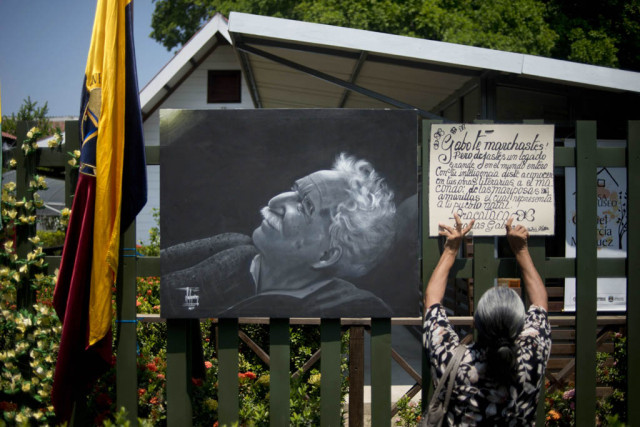Marquez and Pakistan
Marquez’s characters exhibit both surprising compassion and unspeakable brutality towards others and themselves.

A woman places a banner next to a picture of late Colombian 1982 Literature Nobel Prize laureate Gabriel Garcia Marquez, outside the house in which he was born -- now turned into a museum -- in Aractaca, Magdalena Department, in northern Colombia, on April 18, 2014. PHOTO: AFP
Marquez’s fiction focuses on timeless, isolated communities that both experience — and commit — great violence. His characters exhibit both surprising compassion and unspeakable brutality towards others and themselves. The men in his novels are martial, whether it is the isolated, delusional dictator of The Autumn of the Patriarch, or the many military officers — minor characters and protagonists — who feature in so many of his books.
In what critics regard as his magnum opus, One Hundred Years of Solitude, Marquez narrates the story of a family and the town that it founds, and traces both across seven generations in which the town experiences plagues of insomnia, killer ants, war, and neo-imperialism under the guise of the American Fruit Company.
These characters, settings and themes should be intimately relatable to Pakistanis. Whether it is the dictators, the war, the constant show of ghairat and its many lapses — our own political trajectory, the highs, and the lows that outnumber them, uncannily resembles his fiction. The violence, the resilience, the isolation, the contrast between the extraordinary acts of charity and the equally extraordinary cruelty with which we behave towards one another — have been central to Pakistan and to Marquez’s fiction.
Amidst the violence and the solitude — above all — is Marquez’s characters’ capacity to love — quite aptly, even in the time of cholera. Perhaps, it is love — adolescent, spiritual, romantic, familial — or simply its Platonic form that Marquez himself identified to be most salient feature of his characters. Perhaps, it is optimistic, but such a characterisation of ourselves is hardly a fictional notion.
Published in The Express Tribune, April 19th, 2014.
Like Opinion & Editorial on Facebook, follow @ETOpEd on Twitter to receive all updates on all our daily pieces.
















COMMENTS
Comments are moderated and generally will be posted if they are on-topic and not abusive.
For more information, please see our Comments FAQ